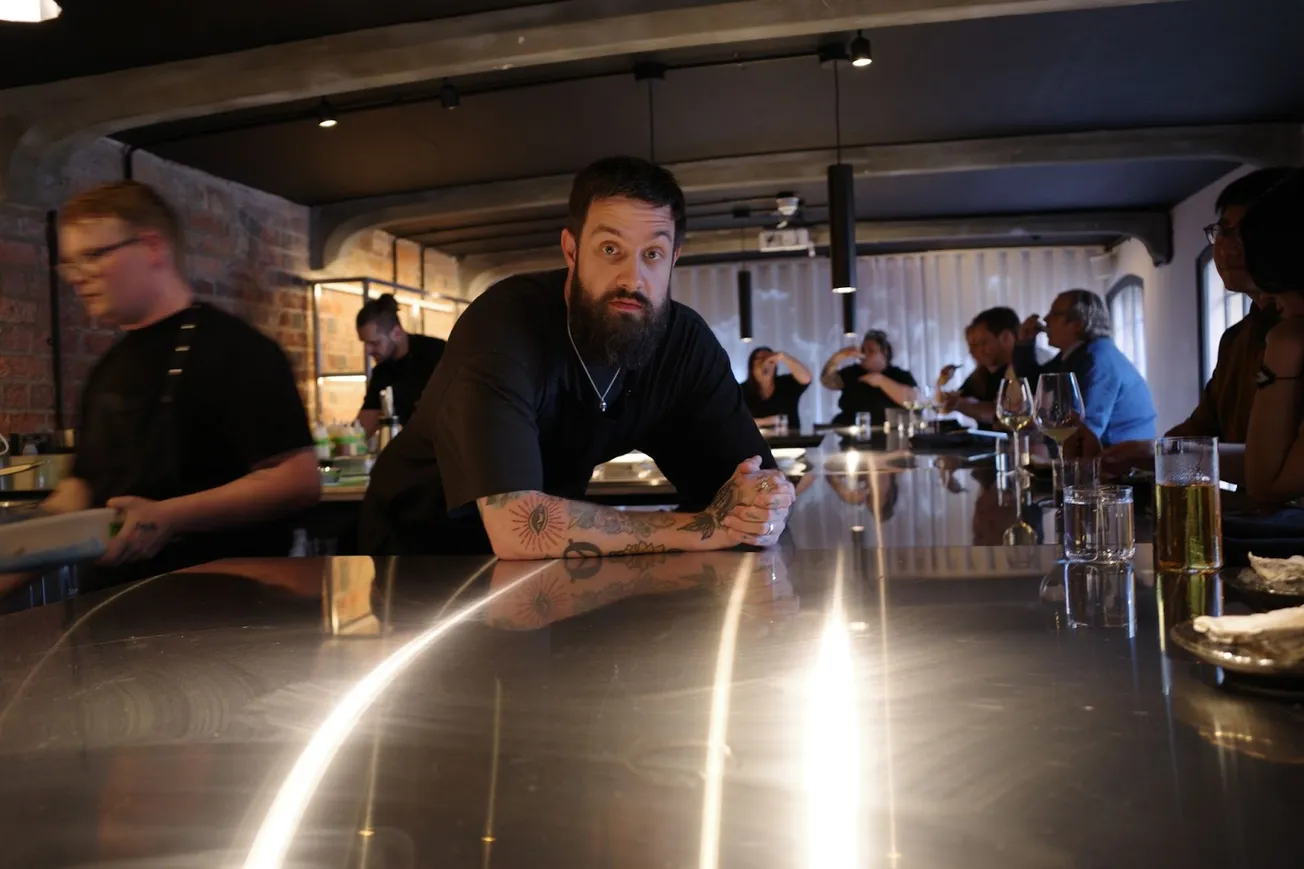By Ophira Gottlieb
“The more restaurants I open, the more softly spoken I become,” Alex says when I complain that he isn’t talking loudly enough into the Tascam recorder. We’re in the front room of Albatross Death Cult, a beautiful and bare-brick building in the Jewellery Quarter. Despite what his claim suggests, this is actually only Alex Claridge’s second restaurant. The first is The Wilderness, an establishment that likely needs little introduction to Birmingham readers, but just in case it does, it is Birmingham’s famous and/or infamous Rock and Roll fine dining extravaganza. But his new place is different: an immersive experience where diners eat in the kitchen at a single table, making incessant small talk with the other customers and chefs. “Traditionally in kitchens, there’s not much talking,” he explains. “But here you’re talking constantly for four hours. My poor little throat. I get home and say to Rachael: Do you wanna never talk again? Would that be ok?”
Myself, Alex, and Rachael – cofounder of Albatross, and Alex’s self-proclaimed “significantly better half” – end up talking for very nearly four hours together before the dinner even begins. Albatross serves mostly seafood, which comes in the form of a tasting menu consisting of 12 tiny not-dishes-but-servings. Each serving is paired with a wine, and I will be pairing a few of them with a topic from our extensive conversation, to paint a picture of what restaurants like Albatross, and the reception they receive, tell us about Birmingham.
SCARLET PRAWN | NAN JIM | KOMBU OLD FASHIONED | ORGIES
I have been suspiciously positioned at the very end of the long, industrial table, limiting my interactions to the couple sitting next to me who, also suspiciously, turn out to be Alex and Rachael’s friends. The other diners are mostly couples, at the present only chatting among themselves, and a single lone diner with an empty seat next to him. Food arrives in the form of two tiny pastries filled with – to my untrained eye – vague and indiscernible seafood. Various seaweed-infused cocktails arrive clear as water, ungarnished, or accompanied only by a huge block of ice. We sip on them and make our polite introductions to our table neighbours.

“The act of forcing a dozen or so strangers to spend hours together in a room shouldn’t be a radical act, but here we are, entering a dwindling niche where it’s this or an orgy,” Alex wrote in a press release for Albatross, which I read aloud to him minutes after sitting down to eat. “I stand by that,” he says. “We don’t offer both though. Maybe that’s the next restaurant.”
Alex explains that his main concerns for Albatross were rooted in British social anxiety. The English general public aren’t used to being forced to interact, and he wasn’t exactly confident that they’d take to it. However, the immersive nature of Albatross is paramount to his vision of the restaurant. “As a chef, you can often feel quite detached from the people you’re actually cooking for,” he explains. “I think you lose something because of that. You should be cognisant of the fact that there’s a real person you’re feeding. Not just ‘Table 3, starters away.’”
At Albatross the chefs can’t reduce customers to a table number, not least because there’s only one table. The cooking is done within spitting distance of the diners, and Alex, Rachael, and the various waiters and sake sommeliers revolve around the room, introducing dishes, offering drinks, pouring water, and all the while making polite if inane conversation. There’s an element of performance to it – as there is in all hospitality – but in this case, it’s all a bit more explicit.
CORNISH MACKEREL SASHIMI | CAVIAR | OYSTER LEAF MARTINI | SLIGHTLY OVERSIZED CHAIRS
Alex believes that “everything should be either slightly too large or slightly too small. Things that are exactly the right proportion lack imagination.” This is not in relation to the tiny portion of sashimi we’ve just received (around one-tenth of a mackerel), but rather the huge table we’re sitting at, which he repeatedly and dramatically refers to as a ‘monolithic kitchen counter’. The large block of concrete that theoretically functions as a table in the front room, however, is the real symbol of Alex’s visions as an interior designer. “I just wanted a big slab of something in the middle of the room,” he puts it simply. Alex believes that restaurants where the aesthetics centre around large amounts of expensive materials subscribe to a form of contemporary luxury that Albatross Death Cult is aiming to avoid.
“If you’ve got the ability to make something slightly larger than it has to be, it’s a far subtler way to speak of confidence, to speak of permanence,” he says.
“You sound like this table is your equivalent of another man’s Ferrari,” Rachael chimes in.
The concrete table plays a significant role in creating the type of luxury Albatross aims to provide, which Alex and Rachael refer to as ‘alternative luxury’. “Traditionally, people might see luxury in a restaurant as caviar, and lobster, and being called sir or madam,” Rachael explains (we are, in fact, eating caviar currently, but that’s reasonably by-the-by). Alternative luxury, on the other hand, focuses not merely on the product you’re buying, but on the feeling you’re buying into.
Alex explains that The Wilderness’ interior design followed much the same principles. Rather than having large tables, Alex furnished the restaurant with chairs that are .5 times larger than they need to be. “There’s more support than you need, more space than you need. The chairs are telling you that you deserve more space,” he says. “I’ve never had anyone come in and say ‘My gosh! This chair is slightly larger than it needs to be! So much room for comfort!’ But these things aren’t necessarily explicit.”

MUSSELS | BLACK PEPPER | IBERICO | HURLUBERLU CABERNET FRANC | LICKING ROCKS
The luxury in Albatross, however, is not necessarily a comfortable one. Rather than oversized armchairs, we are perched on geometric barstools. Here we are served our various dishes: tiny tarts, crumbling pastries, oysters, and sauces to be sipped from the bowl. It’s almost entirely finger food, and there is a noticeable absence of cutlery. I mention to Rachael and Alex that, when reading about the restaurant, I found an article about a dish being served, that you had to lick off a rock. “There’s no rock licking today,” Rachael replies. I must look visibly disappointed, because she adds: “I mean we can make you one, there’s rocks on the floor.”
Rachael and Alex are quick to clarify that the lack of cutlery is not merely a gimmick, nor is it a dogma. “We say no cutlery, but if cutlery makes things easier for people, we’ll bring them some,” Rachel says. To her, the absence of cutlery is simply symptomatic of the restaurant's Japanese influences. “It’s traditional,” she says. “Al would say primal. This is where the licking rocks thing comes from.”
Alex, however, was quick to abandon the rock-licking dish when the press clocked on to it, and it became the focus of media attention. “I have a phobia for anything that’s too widely reported,” he explains. As an example, he refers back to when he first opened The Wilderness. One of the first dishes they served at the restaurant was a dessert garnished with wild, foraged wood ants – an insect Alex assures me is in fact very delicious, and tastes like lemon. However, that one dish became the entire focus of any press coverage about the restaurant. “It overshadowed everything else we were trying to say,” Alex says. He explains that, when opening his first restaurant, he didn’t have the means or the connections to get press coverage any other way. “We relied on things like that, which are easy to pitch and that people would talk about. But when it becomes the dominant thing that everyone asks about, I get worried. I mean, for years I was just Ant Guy.”
“You still are,” Rachael says.

OYSTER | PEACH | APERITIF VINTAGE 2021 | LAZY JOURNALISM
This sort of coverage is precisely the reason behind the pair getting rid of the rocks – but to them, it’s also symptomatic of a wider issue concerning the local press and the food scene in Birmingham. Alex expresses his concern that Birmingham’s reputation for food and restaurants has been skewed and misrepresented by the press. It’s a reputation he describes as “justified, but lacking in detail. There’s a lot of lazy journalism about Birmingham: ‘It’s got x number of Michelin stars, it’s the home of the Balti’. I think that’s incredibly reductive. These things are worth celebrating, but it’s not sufficient to have a dynamic food scene.”
Both Rachael and Alex agree that, while the Birmingham food scene has changed dramatically for the better over the last two decades, there are still a significant number of surprising gaps to be found. However, this is a reason for excitement as well as a cause for concern. “We have incredible street food and incredible fine dining,” says Rachael, “but in between there’s so much space for growth. That’s something that really excites me. Think how many gaps there are to do different things.”
Albatross is effectively, if reluctantly, fine dining, but it also aims to fill one of these gaps. Rachael asserts that the restaurant is fine dining for those that the concept wouldn’t usually appeal to. “For me, growing up, restaurants were this mythical thing that you went to if you got good A-level results,” she explains, elaborating that growing up outside of restaurant culture can lead to a feeling of alienation in such establishments in later life. “We’ve been to plenty of Michelin-star places that we don’t feel comfortable in… and we work in fine dining!” Albatross, on the other hand, is different: the music, the decor, and above all the intimacy allow for the accommodation of a different kind of customer, even if they serve the same sort of food. “The trappings are quite different,” she explains. “They open it up for a different audience.”
But she also agrees with Alex that flimsy coverage and a lack of independent magazines and food writers are negatively affecting the city’s dining scene. “It’s only the big boys or the obvious things that get talked about,” she says, “but, for instance, we have an incredibly big Indian population. We must have some amazing Indian restaurants, but no one talks about them. As an outsider, how do you connect with these places and these communities?”

SUSHI RICE CREAM | “UMAMI” | BOTRYTIS PINOT GRIS | PRACTICAL COLDWATER FISHKEEPING
Our waitress brings over a scoop of ‘rice cream’, either soaked in or made from sushi rice, I can’t remember. I gather that this is dessert, but other than a thin strip of seaweed garnishing the top of it, I’m not exactly clear on what the seafood element is. Still, Alex explained earlier that the seafood-inspired nature of the cuisine is not always to be taken literally: the sea is a frightening, alien force, and sometimes the food is simply frightening, or alien. “People can be creeped out by seafood,” Rachael elaborates. “Tentacles, oysters, anything with eyes. And it’s often mistreated. I think everyone’s had bad calamari. Lots of people have had a dodgy oyster.” But it’s not just seafood that people fear — all three of us seem to share a common fear of the ocean itself.
“Who wouldn’t be scared of the sea?” says Alex, incredulous.
“What’s down there?” Rachel asks rhetorically. “We don’t know.”
However, it’s not just fear that the couple feel towards the sea. In fact, I feel obliged to reveal that Alex actually ran a website called ‘Practical Coldwater Fishkeeping’ at the age of seven, a fact that Rachael reveals to me, and Alex elaborates on reluctantly. “I was really into fish…” he says, trailing off mysteriously. “I also have very nostalgic memories of the coast. I’ve never had an ‘alright’ relationship with the sea. It’s always been either joyful or fearful.” This is oddly reminiscent of something Alex said to me much earlier in the night, about how he would rather serve food that some people love, and other people hate, than serve something nice.
Rachael’s fascinations with the sea, however, are rooted not in actual sea life, but in stories. “I have this weird interest in sea-faring tales. Myths of the sea,” she explains. “I read stories about ships being pulled to the bottom of the ocean by a massive squid and I just think… that squid still lives down there.”
Alex nods earnestly. “Or he’s in government now,” he offers.
This fascination, of course, is the reasoning behind the name of Albatross Death Cult — the ‘Albatross’ part taken from the famous expression, derived from the Rime of the Ancient Mariner. Alex describes it as “what happens when two English grads come up with a restaurant name.”
CHERRY | NAMELAKA | SAKE | PEPPER
For our final dish, the waitress brings over two gelatinous cubes of something or other on a plate. They wobble a bit as she explains them to us in words and ingredients I don’t understand, and Alex comes over again and chats with us about the changing state of dining in the city. “The food scene in Birmingham over the last decade or two has changed massively, and for the better,” he says. “The variety, the interest, the reputation we have now for food… I don’t think anyone from Birmingham would say that’s always been the case. And we’ll keep evolving.”

But the Birmingham food scene will no doubt continue to evolve whether Alex plays a part in it or not. This month marks the beginning of a ten-year lease on the premises that Albatross is based in. What are his plans for the future? “I don’t think restaurants have an infinite lifespan,” Alex says. “I think projects have a start and an end. But I want to keep creating so long as I have something interesting to say.” Considering that he just managed to talk for a four-hour interview, immediately followed by another four hours entertaining guests, I have a feeling we are yet to see the final pretentiously named conceptual fine dining restaurant from Alex Claridge, and I’m glad of it.








Comments